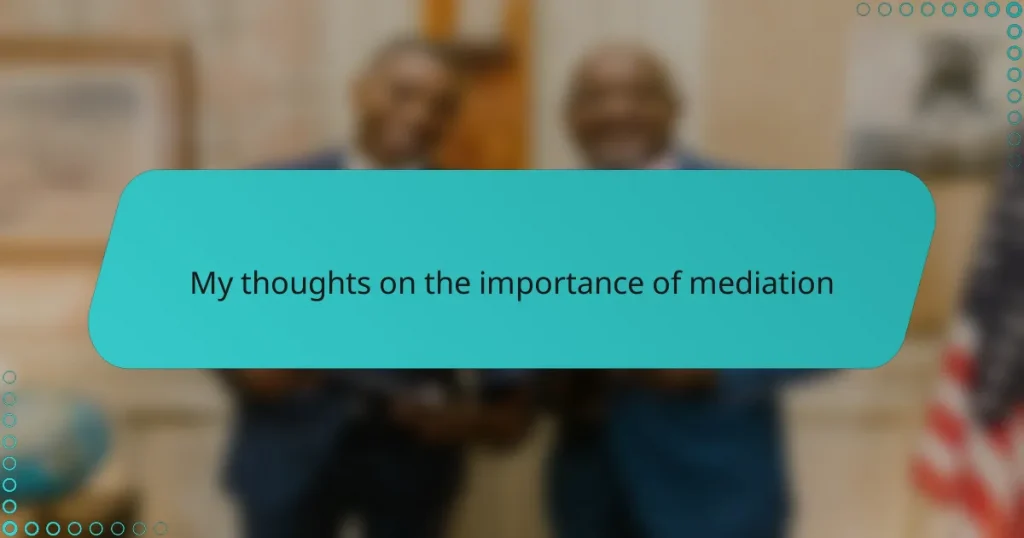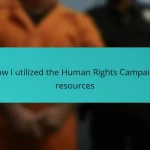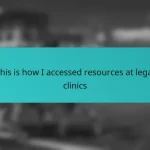Key takeaways
- Mediation transforms legal disputes into collaborative dialogues, empowering parties to shape their outcomes rather than relying on a judge’s ruling.
- It enhances communication skills and offers advocates greater control, often leading to creative solutions that save time and resources.
- Mediation fosters a supportive environment, helping to manage emotions and power imbalances, ultimately making the process more equitable.
- Preparation is essential for successful mediation, including organizing thoughts, gathering evidence, and anticipating responses from the other party.
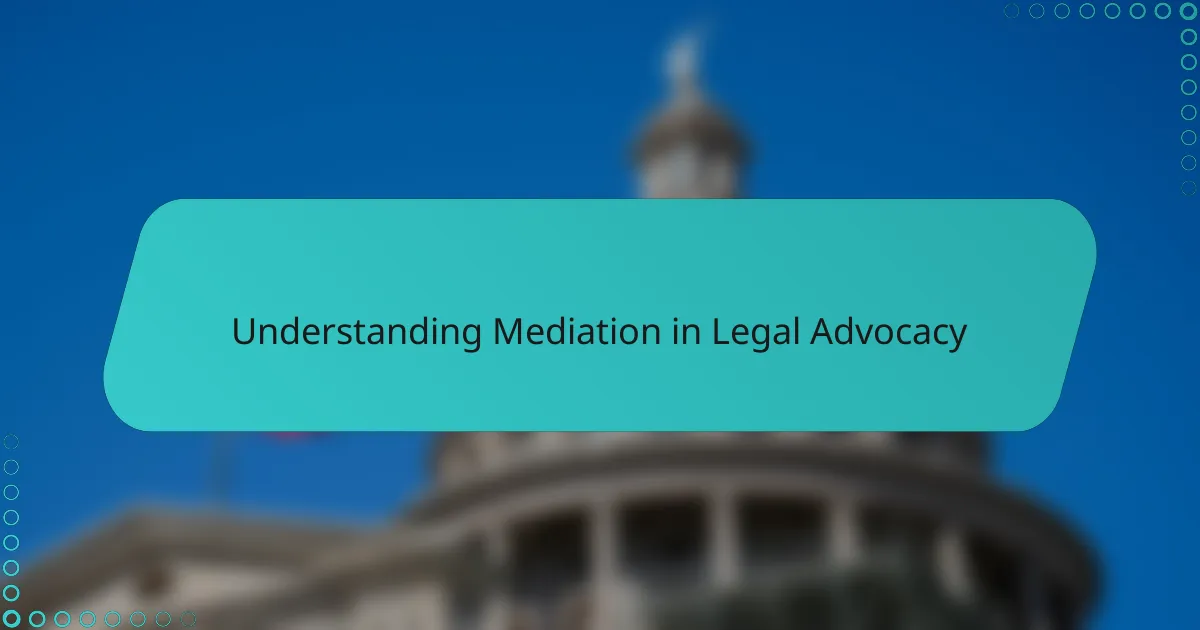
Understanding Mediation in Legal Advocacy
Mediation, in my experience, is often misunderstood as a mere formality in legal disputes, but it is much more—it’s a dynamic conversation where parties actively shape their outcomes. Have you ever considered how powerful it is to have a neutral third party guide a dialogue rather than leaving everything in the hands of a judge?
What strikes me most about mediation is its ability to humanize legal conflicts. I’ve seen how, through respectful communication, parties move beyond rigid positions and find solutions that legal rulings alone couldn’t achieve. Isn’t that a perspective worth embracing in advocacy?
Understanding mediation means recognizing its role not just as an alternative process but as a strategic tool that empowers clients. From my point of view, it opens doors to resolutions that preserve relationships and save time and resources—something every legal advocate should appreciate deeply.
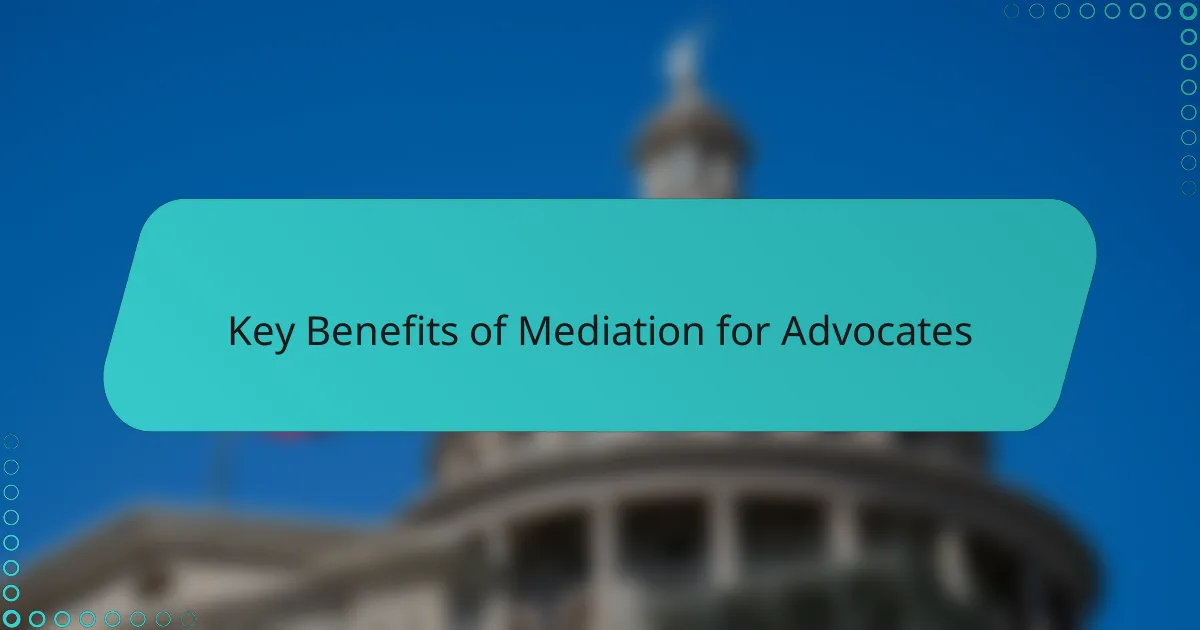
Key Benefits of Mediation for Advocates
One of the benefits I’ve seen firsthand as an advocate is how mediation enhances communication skills. When you guide clients through mediation, you learn to listen deeply and ask questions that reveal underlying interests rather than just positions. It’s a refreshing change from traditional courtroom battles where speaking your mind sometimes feels like a monologue rather than a dialogue.
Mediation also offers advocates greater control over outcomes. I remember cases where rigid legal rules couldn’t offer the flexibility clients needed, but mediation allowed creative solutions that truly fit their unique situations. Doesn’t having that kind of adaptability make you feel more empowered in your role?
Lastly, mediation saves time and resources in ways that sometimes surprise even seasoned lawyers. I’ve been involved in disputes that dragged on for years, soaking up energy and expenses. By contrast, mediation often wraps things up faster and with less stress, giving both advocates and clients a much-needed breather. Isn’t that a benefit worth pursuing?
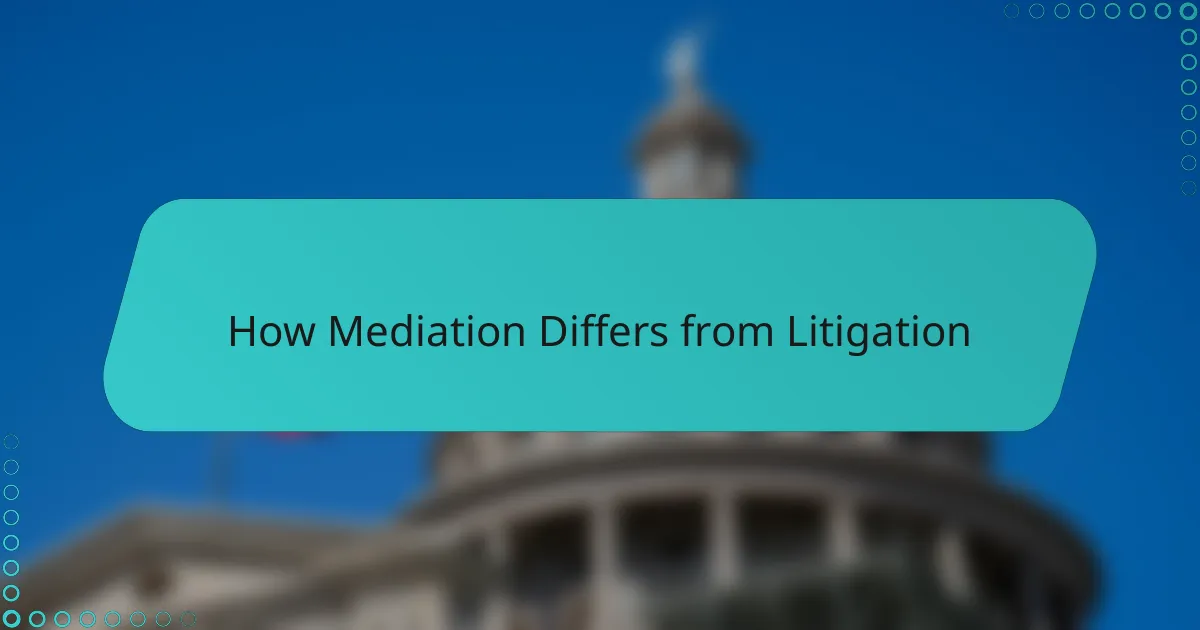
How Mediation Differs from Litigation
What I find most striking about mediation compared to litigation is the atmosphere it creates. Instead of a courtroom’s adversarial setting where each side battles for victory, mediation fosters collaboration and dialogue. Have you ever noticed how this shift changes the energy from confrontation to problem-solving?
Litigation often feels like surrendering control to a judge or jury, which can be daunting for clients. In my experience, mediation hands some of that control back, allowing the parties involved to craft outcomes that truly reflect their needs. Doesn’t it seem more empowering when clients are the architects of their own resolutions, rather than passive recipients of a ruling?
Also, the pace of litigation can be exhausting and rigid, stretching on for months or even years. I recall cases where the slow grind drained everyone’s resources and hope. Mediation, by contrast, is usually faster and more flexible, which to me means less emotional toll and a brighter path forward. Isn’t speed and adaptability something every advocate should value?
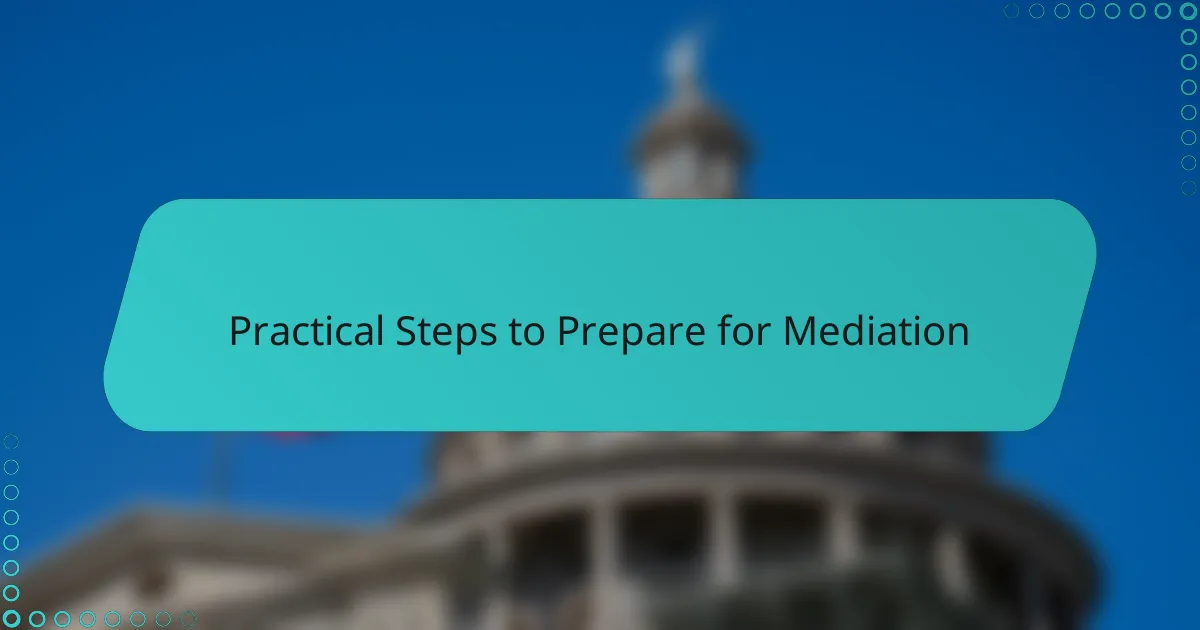
Practical Steps to Prepare for Mediation
Before stepping into the mediation room, I always advise clients to organize their thoughts clearly. What are their core interests versus their initial demands? From my experience, writing these down helps prevent emotions from clouding judgment and keeps the discussion focused on what truly matters.
Another practical step I emphasize is gathering all relevant documents and evidence beforehand. It’s surprising how often parties come unprepared, making the process less efficient. When you’ve got your facts at your fingertips, it not only boosts confidence but also signals seriousness to the other side.
I’ve also found that rehearsing potential scenarios with clients can be invaluable. Asking, “How might the other party respond to your proposal?” encourages us to anticipate reactions and craft more persuasive arguments. This preparation often transforms mediation from an uncertain gamble into a strategic conversation. Have you tried this approach yourself?
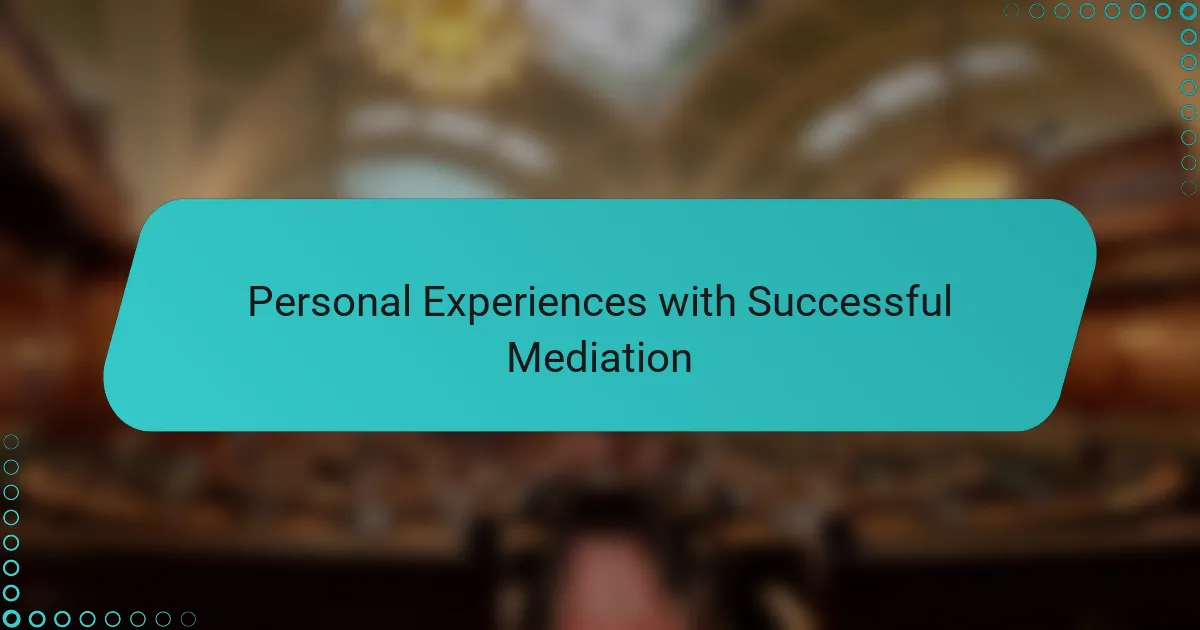
Personal Experiences with Successful Mediation
One case that sticks with me involved two business partners on the verge of dissolving their company. Through mediation, we uncovered shared concerns and future goals they hadn’t discussed before, which led to a mutually beneficial agreement. Witnessing their relief and renewed trust made me realize how mediation can heal more than just legal disputes.
I also recall a family dispute where emotions ran so high that courtroom intervention seemed inevitable. Yet, during mediation, the atmosphere changed—people listened rather than argued. It was powerful to see how a structured conversation helped them preserve relationships that could have been irreparably damaged. Have you ever seen conflict transform simply by shifting how people communicate?
In another instance, mediation brought surprising creativity to a contractual disagreement. Both sides felt stuck with limited options, but the mediator encouraged exploring alternatives, leading to a solution that satisfied everyone’s core interests. That experience convinced me that mediation often uncovers possibilities litigation could never offer. Isn’t that what every advocate hopes for—a resolution that feels fair and lasting?
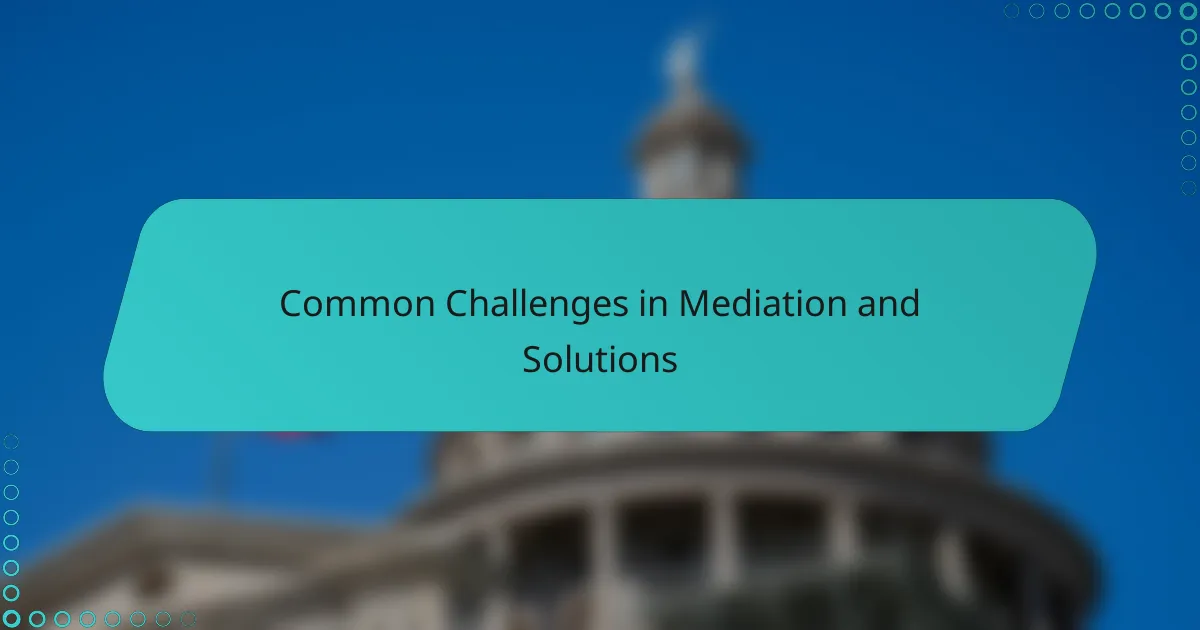
Common Challenges in Mediation and Solutions
One challenge I’ve frequently encountered in mediation is managing emotions. Parties often come in feeling frustrated or hurt, which can cloud their judgment. I’ve learned that acknowledging these feelings upfront and creating a safe space for expression can defuse tension and open the door to productive dialogue. Have you noticed how just feeling heard can shift someone’s attitude dramatically?
Another common issue is the imbalance of power or knowledge between parties. From my experience, when one side dominates the conversation or holds more information, it risks undermining the fairness of the process. That’s why skilled mediators and prepared advocates are crucial—they ensure the playing field levels out, helping everyone voice their real concerns and interests.
Finally, timing can be a tricky obstacle. Sometimes mediation is introduced too late, after bitterness has taken hold, or too early, before parties are ready to negotiate. In my cases, the key has been recognizing the right moment to bring people together, often with some groundwork beforehand, so that mediation feels like an opportunity rather than a forced step. Isn’t timing everything when trying to resolve conflicts peacefully?
